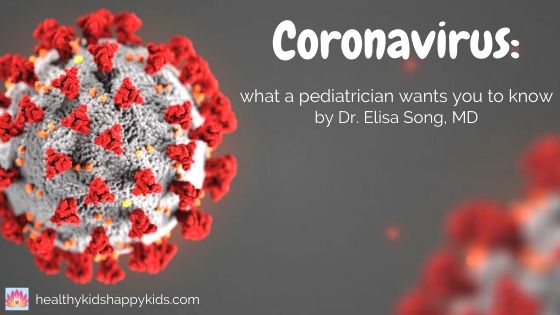
01 Mar CORONAVIRUS (COVID-19) WHAT A PEDIATRICIAN WANTS YOU TO KNOW.
There are commonsense measures to protect yourself from coronavirus, COVID-19 that you should be practicing regardless of whatever virus is circulating at the moment. The only unique recommendation with COVID-19 is to avoid unnecessary contact with non-domesticated animals due to presumed animal-human transmission. Other commonsense measures to protect yourself and prevent spread of illness include:
- Wash hands frequently, especially before eating or touching your face. Washing hands with warm soap and water for at least 30 seconds is the best option. This study found that washing hands even with plain running water without soap was more effective than ethanol-based hand disinfectants at killing the Influenza A virus! (36)
- Avoid touching your eyes, nose, and mouth! Do your best to keep those little fingers away!
- Stay home when you’re sick, unless you need urgent medical attention. You may be increasing your possible exposures to COVID-19 if you don’t have it, or exposing others unnecessarily if you do.
- Cover your cough with your elbow or tissues. Teach your kids proper cough etiquette. And if you use a tissue, immediately throw it into the trash and wash your hands.
- Keep your distance. Try to stay at least 6 feet away from anyone who is obviously sick with fever and/or respiratory symptoms.
- Irrigate your nose. While we do not know if nasal irrigation makes a difference for prevention of COVID-19, I believe that one of the MOST preventive things you can do for any viral respiratory illness is to irrigate your, and your children’s, nasal passages with Xlear nasal spray at the end of every day and after any potential exposure (work, school, playgroups, plane travel, etc.). This is a saline nasal spray with xylitol and grapefruit seed extract, both of which have antimicrobial properties. You cannot overdo it, and will not get “addicted” to it. Other options for nasal irrigation are a regular saline spray, Neti pot, and other sinus rinses like Neilmed.
**Apart from regular hand washing, I believe that daily and frequent nasal irrigation is one of the MOST important things that we can do to prevent influenza and other viral respiratory infections from taking hold.** This is because after exposure to a virus, the influenza virus tries to invade and multiply in your nasal passages for at least 1-2 days before you develop any symptoms. Nasal irrigation can wash away viral particles before they have the opportunity to take hold, and thereby prevent many infections from happening in the first place! - Load up on foods and spices with antiviral properties. These include coconut oil, raw garlic, oregano, ginger, kimchi and other fermented foods, walnut, pomegranate, green tea, apple cider vinegar, and medicinal mushrooms (shiitake, maitake, reishi, cordyceps, turkeytail).
- Eat lots of colorful fruits and vegetables. They are full of antioxidants which will destroy the free radicals that weaken our immune system and are responsible for making us feel sick when we catch a bug. Each color provides different antioxidant power – so be sure to eat a rainbow everyday. If you’re kids aren’t the hugest vegetable eaters yet, give them their antioxidant dose with a smoothie packed with fruits AND veggies, use that smoothie to make jello with grass-fed gelatin or popsicles, sneak pureed vegetables into your spaghtetti sauce, soups, chilis, or whatever other way you can think of – be creative!
- Stay well-hydrated. Stick to water, coconut water, herbal teas, and bone broth. No soda or sugary drinks, please! What’s a good estimate for how much water you need at a minimum? Divide your body weight (in pounds) in half and drink that number in ounces! Do you come close?
- Drink your bone broth! Bone broth has amazing immune-supporting properties. See Amazing Bone Broth to get started easily making your own.
- Eat fermented foods. The probiotics contained in fermented foods have tremendous immune boosting powers. In fact, the fermented Korean cabbage, kimchi, was found to have significant effects in preventing and fighting the H1N1 influenza virus! Other examples of delicious fermented foods to try include sauerkraut, pickles (try “real” pickles without added vinegar like Bubbies), miso, kefir, and kombucha.
- Avoid simple sugars and processed/junk food. Did you know that your blood shows lab evidence of a lowered immune system within 30 minutes of eating simple sugars (like glucose, refined sugar, and fructose), and causes a 50% reduction in your white blood cells’ abilities to kill germs? White blood cells are our “army” cells that fight off germs. This effect is most noticeable 2 hours after ingestion, but is still present 5 hours later! Keeping blood sugar levels healthy has been shown to improve immune system activity.
- Get fresh air and moderate daily exercise. Moderate exercise can boost the production of macrophages, the kind of white blood cells that “eat” bacteria and viruses. However, intense exercise can actually temporarily decrease immune function – so don’t overdo it!
- Get adequate sleep. An increase in sleep actually increases the number of your white blood cells. On the other hand, loss of sleep even for a few hours at night, increases inflammation in our body which makes us more susceptible to catching the flu and having more severe symptoms. So make sure your whole family is getting enough zzzz’s. For tips on getting a good night’s sleep, see Eat Yourself to a Good Night’s Sleep and The 3 Things You Need to Know to Get a Good Night’s Sleep.
- Minimize stress. Emotional stress creates physiological stress in our bodies that lowers our immune defenses and makes us more vulnerable to illness. Stress has been shown to lower our white blood cells’ abilities to kill germs, and actually creates more inflammation that may make us feel even sicker.
For more information, please visit this article

No Comments